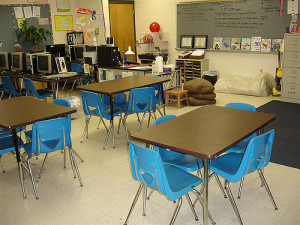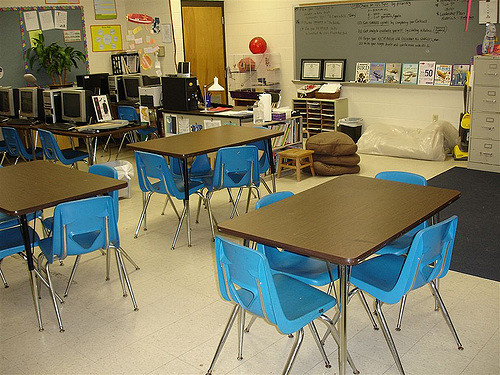>> I used to love teaching high school English during an election year. The political ads, speeches, and debates. The rhetoric, persuasion, and fallacies. Students can be given voice and choice as they explore candidates’ views. Research leads to lively discussion. Students come in ready to do battle for their preferred presidential candidate.The lesson plans practically write themselves. I’m the moderator, calmly and consistently leading them back to the texts for their support, keeping my own political views out of it.
I used to love teaching high school English during an election year. The political ads, speeches, and debates. The rhetoric, persuasion, and fallacies. Students can be given voice and choice as they explore candidates’ views. Research leads to lively discussion. Students come in ready to do battle for their preferred presidential candidate.The lesson plans practically write themselves. I’m the moderator, calmly and consistently leading them back to the texts for their support, keeping my own political views out of it.
Not this year. If I were teaching this year, I’d have several ethical struggles as I crafted my class: Do I stay neutral or share my political views with my students? Would their parents want me to influence them? Shouldn’t I be trying to sway them? Aren’t I complicit if I stay silent? Could I get in trouble with administration if my views don’t align with the general school population? Isn’t it worth it if it protects students who feel maligned from inflammatory speech?
>>Teachers around the country are struggling with these or similar questions. And this week one teacher in Hillsborough, North Carolina, Amanda Harder, >> resigned after recordings of her telling her students that Trump is a “master of pathos,” that he is “poking the fires under particular niches of people in this country…” and that the “ only people who seem to be safe from this guy are white Christian male Americans” gained national and international attention.
The Orange County School Board released a statement saying they have “clear policies that prohibit staff from promoting or denouncing a particular candidate or party… there is a fundamental difference between educating and advocating… ”
Yet, even before this event, several NC educators I spoke to said that students should know who their teachers are voting for. A civics teacher pointed out that if a student doesn’t already know where you stand, there is something fundamentally wrong with the relationship between the teacher and students. You obviously have not spent time talking to them as people.
A former government and history teacher said, “As a history teacher, I feel it is unethical to keep your opinions out of the classroom because those opinions come out in our teaching. It is better to let everyone know about our bias upfront. Otherwise we present biased information under the pretext that it is fact.”
His lessons would be the same as always this year. He would tell the students how he was voting (for Trump), discuss bias and why it’s important for the students to know who he is voting for, analyze the platforms of the candidates in class, and “combat the misinformation students receive from the internet or other classrooms.”
Yes. Other classrooms. All of the history teachers I spoke to felt that their students either already knew their bias and that it made sense because of the courses they teach. However, this teacher felt that most biased and inaccurate lessons are imparted in other classes where politics are not an integral part of the curriculum. Does that mean it is okay for a history teacher, but not others?
Part of the furor over Harder’s class was that she allegedly had students look for comparisons between Trump’s speeches and Hitler’s. Both the civics and government teachers would not have done that, saying they wouldn’t compare anyone to Hitler. One noted that it would be different if the teacher also gave Clinton’s speech to the students for analysis (I don’t know that she didn’t) and the other saying it would be okay if the teacher has used Hitler for examples of rhetoric in the past.
An English teacher and I, on the other hand, didn’t see anything wrong with giving the students the speeches to analyze. If students notice patterns and similarities, that’s fine. To be fair, I probably would have given speeches from Clinton as well, even if I assumed the conclusions the students would draw.
Whether or not you agree with the lesson on Trump-Hitler rhetoric, teachers still have to figure out what they will say to students. Not just history teachers. Any teacher with whom students have a relationship and turn to for advice — so hopefully most of them. As the civics teacher said, “We have a responsibility to the future voters that demand teachers subject students to the consequences of democracy.”
Right now teachers are preparing their lessons and thinking about what they are willing to risk for their learning objectives. There are >> resources available to help them and hopefully they have the support of their school.
Do they have your support? How do you think this election should be handled in the classroom?
Jennifer Brick is a freelance writer and former teacher in Durham, North Carolina. She earned her Masters of Fine Arts in Creative Nonfiction from Goucher College. Follow her on Twitter @jenbrickwrites.

There are no comments
Add yours